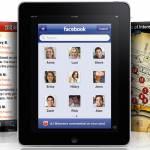Wall Street Journal's pay-more pricing is stupid

Are you paying Rupert Murdoch 18 bucks a month for a Wall Street Journal iPad subscription? I dare you to confess. Today, during News Corporation's earnings call, CEO Murdoch claimed that the Journal has 64,000 active users on iPad. Presumably one of them is you. Confess -- comments are open -- and tell us all what is your reason.
I ask because I see the Journal as having gone too far with its paywall approach. I'm testing iPhone 3GS again, and I downloaded the WSJ app last week. I logged in with my Web subscription account, and the Journal let me read for a couple days. Then came the demand for more cash. Not much, just a buck a week. But I'm already paying for the Web subscription, for which the Journal charges about $150 a year. So Murdoch wants another 52 bucks a year for iPhone and about another $215 for iPad, which I also am testing? OK, it's only $207 a year for iPad if taking advantage of the $3.99-a-week promotion.
Apple has gone too far

Last month, I asked Betanews readers to answer question: "Has Apple gone too far?" For the majority, the answer is a resounding "Yes!" I didn't expect the vehement Apple whacking reaction. Did you?
Today is appropriate day for readers' answers. Apple announced sales (more likely shipments) of 1 million iPads and that App Store had reached 200,000 applications. Apple restrictions around iPad and the iPhone OS 4.0 SDK led to my asking the question. Additionally, today, unconfirmed reports have the US Justice Department and Federal Trade Commission jockeying over which agency could start an Apple antitrust investigation. The investigation would look at Section 3.3.1 of Apple's developer agreement, which restricts cross-platform technologies like Flash or Java.
Warning! 3D TV can kill you

If you're like me, and you're among the dozen or so who still watch the nightly half-hour of American commercial broadcast TV news, you've probably noticed that about a quarter of that time is devoted to ads. Two-thirds of those ads are devoted to drugs, and half of those drug ads are devoted to warnings about the many gruesome, horrid ways in which you might unexpectedly die. The unspoken reason why these ads appear there in the first place is because advertisers reason that if you're still watching the Evening News, you must be afraid to touch your computer or your smartphone to read the real news from TMZ, which makes you (wait for it...) old. (Meaning, above 29.)
Samsung's Australian unit doesn't want the drug companies to have all the fun. Barely a month after releasing its 3D television offerings on an unsuspecting world, the company has published a warning on its Web site down under that outlines a list of risks so serious that those network news drug spots seem tame by comparison.
Twelve billion iBalls fall into Gizmodo's lap

What's a mobile device prototype worth?
Depends on who you are. If you're Apple, it's priceless. When you tightly control every aspect of the product development process, anything that subverts the message is a potential risk to the brand. Loss of control to a company like Apple is unthinkable. If you're Gizmodo, the answer is $5,000 -- which is the amount the tech blog reportedly paid to an unnamed individual who supposedly found the prototype of Apple's upcoming fourth-generation iPhone in a California bar.
The iPad delay is a crock

Sorry, Apple, but your decision to delay introducing iPads internationally doesn't wash. Your excuse -- that US demand was unexpectedly high and, as a result, you had to prioritize customers stateside until production could catch up -- is about as shallow and transparent as a Petri Dish full of Joost's good ideas.
I don't believe Apple's flimsy excuse and I don't believe anyone else should, either. If you think that Apple, master of the consumer electronics zeitgeist, was unable to accurately predict epic interest in a tablet whose existence was first speculated upon prior to the Battle of Hastings, I've got a bridge to sell you. (It's in Saskatoon, but it's a nice one.) And if you think Apple was somehow precluded from filling its global supply chain with as many iPads as its magic wand could conjure, I suggest you chuck the Kool-Aid and find yourself a tall glass of juice. Prune juice, maybe.
Psst...Wanna buy a used Palm?

As rumors swirl around the latest chapter in Palm Inc.'s checkered journey from mobile darling to also-ran, I'll resist the urge to place bets on which company or companies will be making an acquisition play. It almost doesn't matter who buys Palm at this point. What matters is what that buyer does with Palm afterward, and how any acquisition would affect that company's existing mobile strategy.
For quite some time, it's been obvious to everyone but Palm that it would eventually need a white knight. Palm seems to have finally clued in, as Bloomberg is now reporting that the mobile device vendor has engaged Goldman Sachs and Qatalyst Partners to find a buyer.
The true cost of iAd

Despite all the buzz this week that the upcoming major update to the iPhone/iPod touch/iPad operating system was all about multitasking and APIs, the real story was iAd. Although multitasking-deprived Apple fans haven't been holding their breath for almost three years waiting for an advertising framework, the new mobile ad network is infinitely more significant to the future of the platform than the ability to run more than one app at a time.
In many respects, iAd is nothing short of a full frontal assault on Google. While Google's model for generating ad revenue from activity-linked behaviors has rewritten the rules of advertising over much of the past decade, the path for the mobile market has not been as linear. Desktops and laptops have more than enough bandwidth and screen real estate to easily accommodate subtle text-based ads (or not-so-subtle dancing-cow banners) without significantly disrupting the end user experience. Indeed, many users can become so engaged in a given service -- search, mail, productivity, mapping, whatever -- that they virtually ignore the presence of ad-containing boxes toward the edge of the screen. Even if they're aware of them, the delivery paradigm on a traditional desktop, evolved in recent years to a ruthless level of efficiency, is largely responsible for Google's meteoric corporate rise.
Hey, Apple, Microsoft, mobile multitasking is a necessity

Apple's "Get a sneak peak into the future of iPhone OS" event, in two days, is reason enough to re-raise the thorny topic of multitasking on smartphones. Apple's iPhone OS 3.x -- on iPad, iPhone and iPod touch -- limits running background applications. Microsoft is taking a similar approach with Windows Phone 7 (Thank God, the company dropped "Series" from the name).
Here's where I whack aside the head my former analyst colleague, Michael Gartenberg -- or you can whack me (in comments) if you agree with him. Gartenberg and I are polarized on the topic of mobile multitasking. He thinks it's unnecessary, I say it's a necessity. In March 25 post "Windows Phone 7 Series imitates Apple's iPhone in the worst ways," I asserted: "People take multitasking for granted on the PC, which will make its absence more noticeable on the smartphone." I'd argue that because of applications' or features' contextual appeal, running background applications will increase in appeal over time. There are reasons why Google, Nokia or Palm operating systems allow multitasking, and seem to do so without any major hit on battery life (I've tested Android, Maemo and Symbian devices, but not WebOS).
A bill too far: With iPad, AT&T attempts a triple-dip

Do you ever get the impression your wallet is being relentlessly sucked dry? Or that consumers are being expected to pay for an ever growing list of subscription-based services that, in a less profit-mad world, would likely be free?
Apple's gotten quite enough publicity from me and my colleagues over the last little while. So while I hate to harp on the iPad yet again this week, I can't let go of the fact that this particular introduction represents yet another step toward the deepening fiscal enslavement of consumers.
RIM approaches the edge: BlackBerry needs a reboot, fast

Is the BlackBerry beginning to go bad?
It's becoming increasingly difficult to ignore the rising volume of speculation that the smartphone that started the smartphone revolution may be moving into a bit of a middle-aged funk. The share price of BlackBerry maker Research In Motion took a hit Thursday after the company reported lower-than-expected earnings for the last quarter. Although bottom line revenue rose by 37% and the company added 4.9 million subscribers globally, the numbers failed to meet expectations and spawned growing concern that RIM's best days may be behind it.
Apple must apply 'right price, right rights' model to e-books

There are many reasons why iPod and iTunes Store succeeded where competing products failed. But two reasons stand out: Right price, right rights. If iBookstore is to succeed, Apple must apply the same model to e-books and other publications sold there. CEO Steve Jobs and company must seize control of pricing during content negotiations -- and, more importantly -- rights. There must be a single (and generous), standard usage right for all titles, including magazine and newspapers.
When Apple launched iPod in October 2001, the "right price, right rights" model was the best possible: Free. Music labels hadn't locked down CDs with onerous digital rights management mechanisms. Therefore, people could rip music and make their own "mixed tapes" CDs. Meaning -- people buying iPod already owned content they could put on the device. Apple wisely chose not to restrict music copying to iPod. The price was free and the rights were unrestricted.
Let's keep the iPad in proper perspective

Can you vehemently disagree with a colleague and still respect him? Despite the often passionate claims of our readers and commenters, who may have forgotten the era of Siskel & Ebert, I believe you can.
I'm as much a fan of a vigorous debate as anyone else. In my previous column last Thursday, Enough with the Apple bashing!, I apparently stepped on the baby toe of fellow Betanews contributor, Joe Wilcox. As scathing as his response -- entitled Of course media bias favors Apple -- was, I assure you I've got pretty thick skin.
Of course media bias favors Apple

I have three questions for my Betanews writing colleague Carmi Levy: Do you own a Mac or iPhone? Do you invest in Apple? Did you preorder iPad or plan to buy one next week? For fair disclosure, I am writing this post on a 13-inch MacBook Pro (running Snow Leopard). I don't own an iPhone (anymore) and I have never invested in Apple (I own no stock whatsoever; I'll die poorer by my no-conflict-of-interest principles). I ask these questions because he writes: "To set the record straight, from where I sit, the media are not biased toward Apple."
Carmi Levy made that -- and many other shocking statements -- in late Thursday post: "Enough with the Apple bashing!" Eh, what Apple bashing? In my Sunday post, "Be smart, don't buy into the iPad hype," I gave clear examples how bloggers, reporters and Wall Street analysts are biased in favor of Apple. My colleague offers no evidence, just innuendo, to support claim that a "backlash against Apple increases to compensate" for Apple succeeding "where others have failed."
Enough with the Apple bashing!

As the hype machine for iPad availability revs up into overdrive (and, in some cases, tacks on afterburners), in a desperate effort to restore balance to the universe -- or, in some people's lives, what passes for a universe -- backlash against Apple increases to compensate. I'm thinking it's getting more than a little ridiculous to demonize a company because it's managed to succeed where others have failed.
I'm thinking it's time to stop the silliness.
Windows Phone 7 Series imitates Apple's iPhone in the worst ways

For years, people have accused Microsoft of being an imitator, rather than innovator. Finally there is evidence: The ways Windows Phone 7 Series imitates the very worst of Apple's iPhone. Unless there is the strangest of coincidences -- like two students having the same wrong answers on a high school history test -- Microsoft is imitating Apple, using the same strategy to make the same mistakes. It's either imitation or incompetence, and out of fairness I assume the former.
The first imitation is the most baffling: Limited multitasking. Like iPhone, Windows Phone 7 Series will allow multitasking for some of its own applications, but not others. When open but not in use, third-party apps go into a pseudo-off ("dehydrated") state. By comparison, Google's Android, Nokia's Maemo or Symbian OS and Palm's WebOS all multitask (e.g., run background applications) just fine.
Recent Headlines
Most Commented Stories
BetaNews, your source for breaking tech news, reviews, and in-depth reporting since 1998.
© 1998-2025 BetaNews, Inc. All Rights Reserved. About Us - Privacy Policy - Cookie Policy - Sitemap.